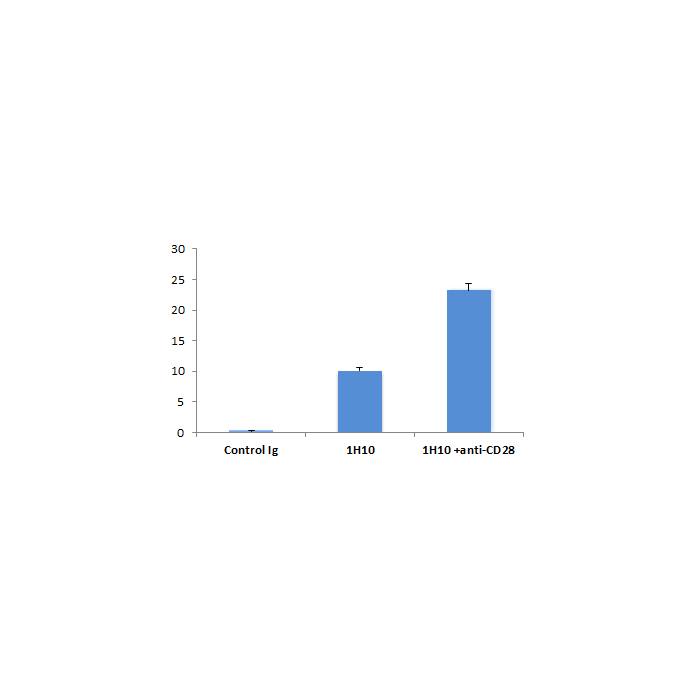Cookie Policy: This site uses cookies to improve your experience. You can find out more about our use of cookies in our Privacy Policy. By continuing to browse this site you agree to our use of cookies.
AdipoGen Life Sciences
anti-PD-1 (mouse), mAb (blocking) (1H10) (preservative free)

Method: Magnetic bead affinity purified CD4+ T cells from C57BL/6 mice are stimulated in vitro with PD-1 (mouse), mAb (blocking) (1H10), anti-CD28 and rat IgG2a isotype (control Ig) (0.25µg/2x105 cells) for 48h. Proliferation is determined by [3H]thymidine incorporation in triplicate wells. The data are representative of five independent experiments. The presence of anti-CD28 mAb increases 1H10 mAb-mediated proliferation.
| Product Details | |
|---|---|
| Synonyms | CD279; Programmed Cell Death Protein 1 |
| Product Type | Monoclonal Antibody |
| Properties | |
| Clone | 1H10 |
| Isotype | Rat IgG2aκ |
| Source/Host | Purified from concentrated hybridoma tissue culture supernatant. |
| Immunogen/Antigen | Mouse PD-1 transfected cell line. |
| Label/Conjugates | Preservative Free |
| Application |
Functional Application: Blocks PD-1 binding. Induces a rapid activation and proliferation of T cells at concentration of 0.25µg/2x105 cells. |
| Crossreactivity | Mouse |
| Specificity |
Recognizes mouse PD-1 (CD279). Does not cross-react with human PD-1d. |
| Purity | ≥95% (SDS-PAGE) |
| Purity Detail | Protein G-affinity purified. |
| Endotoxin Content | <0.01EU/μg purified protein (LAL test; Lonza). |
| Concentration | 1mg/ml |
| Formulation | Liquid. In PBS. |
| Isotype Negative Control | |
| Accession Number | https://www.ncbi.nlm.nih.gov/protein/NP_005009.2 |
| Shipping and Handling | |
| Shipping | BLUE ICE |
| Short Term Storage | +4°C |
| Long Term Storage | -20°C |
| Handling Advice |
After opening, prepare aliquots and store at -20°C. Avoid freeze/thaw cycles. |
| Use/Stability | Stable for at least 1 year after receipt when stored at -20°C. |
| Documents | |
| MSDS |
 Download PDF Download PDF |
| Product Specification Sheet | |
| Datasheet |
 Download PDF Download PDF |
CD279 (Programmed Cell Death Protein 1; PD-1) is a type I transmembrane protein belonging to the CD28/CTLA-4 family of immunoreceptors that mediate signals for regulating immune responses. Members of the CD28/CTLA-4 family have been shown to either promote T cell activation (CD28 and ICOS) or downregulate T cell activation (CTLA-4 and PD-1). CD279 is expressed on activated T cells, B cells, myeloid cells and on a subset of thymocytes. In vitro, ligation of CD279 inhibits TCR-mediated T cell proliferation and production of IL-1, IL-4, IL-10 and IFN-γ. In addition, CD279 ligation also inhibits BCR mediated signaling. CD279 deficient mice have a defect in peripheral tolerance and spontaneously develop autoimmune diseases.
- Antibody-mediated signalling through PD-1 costimulates T cells and enhances CD28- dependent proliferation: M.L. del Rio, et al.; Eur. J. Immunol. 35, 3545 (2005)
- Exosomes secreted by ST3GAL5high cancer cells promote peritoneal dissemination by establishing a premetastatic microenvironment: M. Horie, et al.; Mol. Oncol. ahead of print (2023)






![CD279 [PD-1] (mouse):Fc (human) (rec.)](https://adipogen.com/media/catalog/product/placeholder/default/adipogen_logo_bw_3.png)